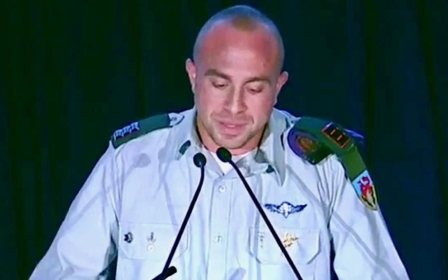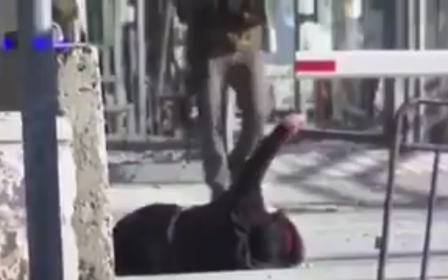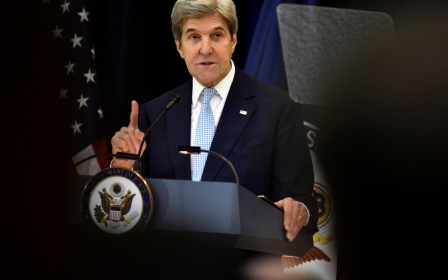Netanyahu: Jerusalem truck attacker was IS supporter
Israel's prime minister has said "all signs" show that a Palestinian man who killed four Israelis in a truck ramming attack in Jerusalem was a supporter of the Islamic State (IS) group.
Islamic State has not claimed the attack at a popular tourist spot in Jerusalem on Sunday, which also wounded at least 15 people, authorities said.
However, Benjamin Netanyahu said: "We know the identity of the assailant, who according to all indications supported IS."
The driver was also killed in what Israeli police were calling an attack at the location overlooking holy sites in the Old City such as the Dome of the Rock and providing one of the most spectacular views of Jerusalem.
Chaos broke out at the scene when the truck ploughed through the crowd, with hundreds of soldiers having arrived there as part of a tour for troops about the history of Jerusalem.
"A lone terrorist drove his truck into a group of soldiers standing on the side of the road," police spokesman Micky Rosenfeld told reporters at the scene.
"They got off the bus, and as they were getting off the bus and getting organised, he took advantage."
Police spokeswoman Luba Samri said the driver was killed by Israeli forces, without specifying whether it was soldiers or police.
Multiple bullet holes could be seen in the windshield of the truck.
Police only confirmed four people were dead, but a medic at the scene said they were soldiers.
Video said to be of the incident being shared online shows a flatbed truck with a crane in the rear drive through a group of soldiers standing next to a bus.
The driver then pulls off to the side and tries to reverse back towards where the soldiers were hit before the truck eventually comes to a stop. Video shows visitors, including soldiers, running for cover as the incident began.
Ambulances rushed to the location and bodies were later covered in sheets.
"I heard my soldiers screaming and shouting," said one of the tour guides, Lea Schreiber.
"I saw a truck that went on the side of the road. Soldiers starting shooting... There were orders and screaming everywhere. They told them to hide behind the wall because there was fear of another attack."
Psychological trauma
Besides treating the wounded, rescue workers also began providing immediate psychological care to traumatised soldiers, said Miriam Ballan of the United Hatzalah rescue service.
Palestinian security officials in the West Bank city of Ramallah said the driver was a Palestinian in his late 20s from the East Jerusalem neighbourhood of Jabal Mukaber, located close to the scene.
Rosenfeld said it was not yet clear if the attack had been planned earlier or was spontaneous.
A wave of Palestinian knife, gun and car-ramming attacks broke out in October 2015, but the violence had greatly subsided in recent months.
Since October 2015, 247 Palestinians, 40 Israelis, two Americans, a Jordanian, an Eritrean and a Sudanese have been killed in a wave of violence, according to an AFP count.
Most of the Palestinians killed were carrying out knife, gun or car-ramming attacks, according to Israeli authorities.
Others were shot dead during protests or clashes, while some died in Israeli air strikes on the Gaza Strip.
Many analysts say Palestinian frustration with the Israeli occupation and settlement-building in the West Bank, comatose peace efforts and their own fractured leadership have helped feed the unrest.
Israel says incitement by Palestinian leaders and media is a leading cause.
The status of Jerusalem is one of the most difficult issues in the Israeli-Palestinian conflict.
The Palestinians see East Jerusalem as the capital of their future state, while Israel views the whole city as its capital.
Middle East Eye propose une couverture et une analyse indépendantes et incomparables du Moyen-Orient, de l’Afrique du Nord et d’autres régions du monde. Pour en savoir plus sur la reprise de ce contenu et les frais qui s’appliquent, veuillez remplir ce formulaire [en anglais]. Pour en savoir plus sur MEE, cliquez ici [en anglais].




